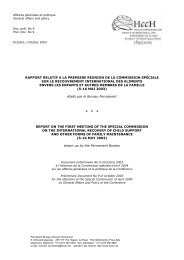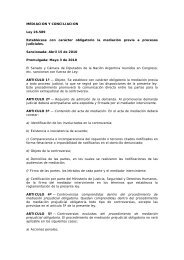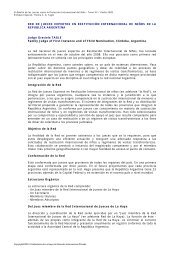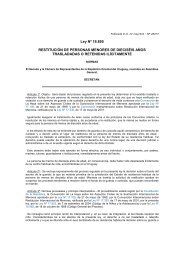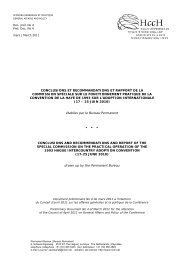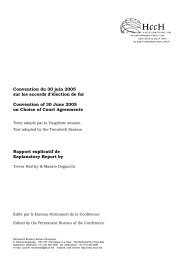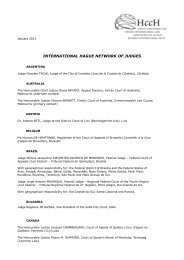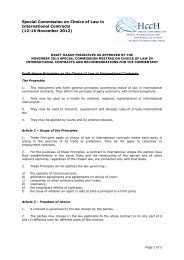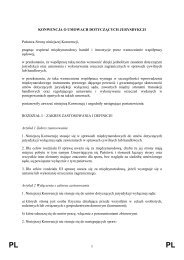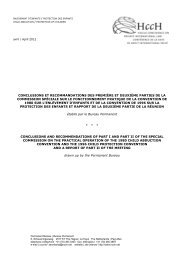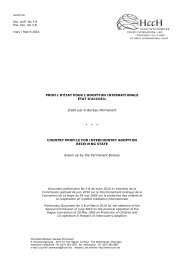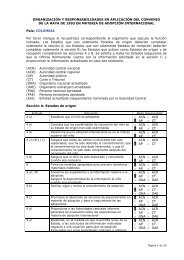aperçu des réponses au questionnaire accompagnant la ... - HCCH
aperçu des réponses au questionnaire accompagnant la ... - HCCH
aperçu des réponses au questionnaire accompagnant la ... - HCCH
You also want an ePaper? Increase the reach of your titles
YUMPU automatically turns print PDFs into web optimized ePapers that Google loves.
Question Réponse / Reply État / State<br />
requested unless satisfied that such method is incompatible with the <strong>la</strong>w of the State or the practice and procedure<br />
of the Court.<br />
4) If no particu<strong>la</strong>r method of service is requested or if the method is either incompatible with the <strong>la</strong>w of the State or<br />
the practice and procedure of the Court, the Central Authority shall direct that personal service be effected upon the<br />
person concerned.<br />
Such service to be effected by the delivery to and leaving with the person concerned one copy of the document to be<br />
served and of any trans<strong>la</strong>tion thereof.<br />
5) The Central Authority shall direct that service under (3) or (4) above shall be effected by the Chief State Solicitor<br />
or by some person or persons <strong>des</strong>ignated for that purpose by him or by the Central Authority.”<br />
Les métho<strong>des</strong> prévues à l’art. 5 n’ont pas changé et cette Autorité Centrale n’envisage <strong>au</strong>cune modification. Italie<br />
Art. 5(1)(a): The Minister for Foreign Affairs <strong>des</strong>ignated as the Central Authority refers the document to the<br />
competent court of justice. Service is then effected either by post (special postal service, Art. 66 of the Mail Act; a<br />
report of service is drawn up by the postman) or through a marshal (see practical handbook second edition).<br />
Art. 5(1)(b): When it is so requested, a marshal will effect service by delivering the document directly to the person<br />
after ascertaining that he/she is the addressee (see practical handbook second edition). Art. 5(2): The Minister for<br />
Foreign Affairs refers the documents sent to it to the competent court clerk. The court clerk informs the<br />
addressee of the documents to be served and the addressee then either presents himself/herself to the court or<br />
requests that they be forwarded to him/her. In the <strong>la</strong>tter case special postal service will be effected (Art. 66 of the<br />
Mail Act; the postman will draw up a report of the delivery). When the person to be served refuses to accept the<br />
documents, or fails to appear or to apply for forwarding the documents to him/her within three weeks of the date on<br />
which he/she was informed, the documents will be returned to the applicant (see practical handbook second<br />
edition).<br />
Service is processed by Execution Department, which is subordinate to Ministry of Justice. Koweït<br />
Under Art. 5(1)(a) of the Convention, methods for the service of documents to individuals as set forth in Articles<br />
117, 118, 119, 120 of the Code of civil Procedure, are the following: The court serves procedural documents by<br />
registered mail, through bailiffs, couriers, and in certain cases – by telecommunication terminal equipment<br />
(Article 117 of the Code of Civil Procedure of the Republic of Lithuania); [see full reply] Under Art. 5(1)(b) of the<br />
Convention, documents can be personally served to the addressee, who voluntarily accepts them, in the court,<br />
through a court courier or through a bailiff.<br />
Jusqu’en 2001 <strong>la</strong> simple remise de l’acte pouvait être effectuée par <strong>la</strong> Gendarmerie ou <strong>la</strong> Police. Depuis, dans tous<br />
les cas, il est procédé à <strong>la</strong> notification formelle de l’acte <strong>au</strong> sens de l’article 5(1), c’est à dire à <strong>la</strong> signification de<br />
l’acte par un huissier de justice.<br />
The Central Authority forwards the documents to the competent district court, which, as a main rule, carries out the<br />
task through a process-server. The methods <strong>des</strong>cribed in the former version of the Handbook are still relevant.<br />
Formal Service: if the documents are to be serviced in the Court District of The Hague, the Central Authority sends<br />
them to a randomly selected bailiff, with the request to serve the documents on the person concerned. If<br />
documents are to be served in another Court District, the Central Authority sends them to the <strong>des</strong>ignated Public<br />
Prosecutor's Office/International Legal Assistance Centre (IRC) and asks for them to be served by a bailiff.<br />
Informal delivery: this works in the same way as for formal service in terms of the <strong>au</strong>thority (sent on to another<br />
Public Prosecutor's Office/IRC or not). The exp<strong>la</strong>natory memorandum to the Implementation Act states that, as a<br />
rule, a local police officer in the Court District concerned should be deployed by the Public Prosecutor for an issue<br />
in the Dutch <strong>la</strong>nguage. However in practice, there is no real uniformity. Depending on where the documents are to<br />
be served, they are sometimes served via postal channels, by the police or by a member of the "documents<br />
service brigade". It should also be said that there is a loophole in the legis<strong>la</strong>tion with regard to servicing civil<br />
Japon<br />
Lituanie<br />
Luxembourg<br />
Norvège<br />
Pays-Bas<br />
Page 18 of 69



